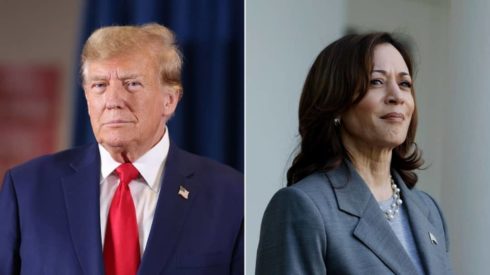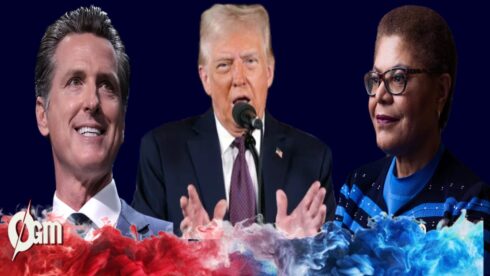As America stands at the threshold of a historic election, two radically different visions of the country’s future have taken center stage. Both Donald Trump and Kamala Harris have described this election as nothing less than a battle for the nation’s soul. Trump warns that a Harris victory would plunge the country into chaos, claiming America will “go to hell” and become “communist immediately” under her leadership. In stark contrast, Harris describes Trump as a threat to democracy, labeling him a “fascist” who craves “unchecked power.”
These opposing views reflect the polarized nature of the current political landscape, especially in battleground states where campaign ads emphasize fear and urgency. This intense atmosphere has not gone unnoticed by voters, many of whom feel caught in a climate of fear. Heather Soucek, a voter in Wisconsin, voiced concerns that both campaigns are exploiting public anxiety. Despite this, she plans to vote for Trump, fearing Harris’s economic policies would destabilize the country. Meanwhile, independent voter Tracy Andropolis shared her apprehension about Trump, worried he may refuse to relinquish power if elected. Their sentiments underscore the deep divisions across the electorate, with each side fearing for the nation’s future if their candidate loses.
A Divided America: Two Nations on Shared Soil
One striking observation as the election unfolds is the pronounced geographic and ideological divide across the United States. Democrats dominate urban and suburban regions, while Republicans hold sway in rural areas. This physical separation increasingly reflects political beliefs, as Americans gravitate towards communities where neighbors share their views. A drive through these areas reveals a landscape marked by Trump and Harris yard signs, highlighting the deeply entrenched partisan identities.
However, this division is not sustainable forever. The election presents a harsh reckoning as these distinct political “nations” must confront each other. For many Americans, election day will be a moment of reckoning, where the hopes and fears of opposing camps come head-to-head in a democratic contest. Whatever the outcome, tens of millions of Americans will face a painful realization that a significant portion of the country holds a vastly different vision for the future. It is an emotional collision that will leave one side grappling with defeat and the other with the burden of uniting a fractured nation.
Trump’s Tumultuous Journey to Election Day
For Trump, the road to election day has been marked by unprecedented legal and personal battles. He made headlines as the first former president to face criminal charges, an episode that drew both criticism and increased support from his base. Trump’s supporters rallied around him with renewed vigor, echoing his claims of being a victim of political persecution by the Biden administration. Each indictment seemed to fuel his campaign further, with his poll numbers rising after every court appearance, reinforcing his supporters’ belief that the system is being used to silence their leader.
The attempted assassination of Trump in Butler, Pennsylvania, in July marked a turning point in his campaign. The image of him, wounded yet defiantly raising his fist, became a symbol of resilience for his followers. It solidified his portrayal as a leader under siege, yet undeterred. Just days later, he appeared at the Republican National Convention, earning the emotional applause of supporters who view him as an “anointed” leader. For them, Trump’s struggles are emblematic of their own fight for an America they feel is slipping away, underscoring the fervor and dedication within his base.
Harris’s Bid to Chart a New Course
Kamala Harris has sought to present an optimistic alternative, emphasizing unity and progress as she steps up to lead the Democratic Party. Following Biden’s withdrawal from the race, Harris energized Democrats at the convention in Chicago, casting herself as a candidate ready to move the country beyond division. Her campaign has centered on issues like reproductive rights, appealing to voters concerned with social justice and personal freedoms. However, maintaining the initial enthusiasm proved challenging, with polls showing Harris struggling to capture the undecided voters critical to her success.
For some voters, Harris’s bid to become the first female president represents a significant milestone. Zoie Cheneau, an undecided voter from Georgia, ultimately chose Harris, drawn by the historic nature of her candidacy despite doubts about her policies. Harris’s campaign faces the ongoing challenge of persuading independents and moderate Republicans, but her supporters remain hopeful. They see her as a candidate capable of healing the nation and believe her emphasis on unity and optimism can bring the divided country closer together, even if only for a moment.
An Election Like No Other: The Stakes and the Fallout
The 2024 election has generated an unprecedented sense of urgency among both parties, with each side viewing the outcome as an existential threat to their values and way of life. Trump and Harris supporters see the stakes as more than just political, fearing the repercussions will reshape America’s identity. This environment has amplified anxiety and distrust, with experts predicting that the aftermath could be marked by legal challenges and potential unrest.
As the nation prepares to cast its ballots, it is clear that this election represents a critical juncture in America’s history. The voting booths will become the ultimate battleground, where the visions of Red and Blue America will clash. The outcome will leave one side feeling vindicated and the other questioning how to move forward in a nation that feels increasingly like two separate countries sharing the same borders














